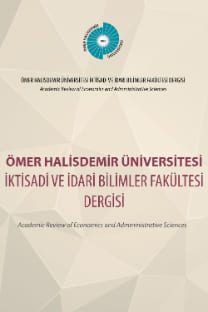Panel Veri Yaklaşımı Altında Gümrük Birliği Anlaşmasının İmalat Sanayine Etkilerinin Bir Analizi.
Gümrük Birligi, Avrupa Birligi, Panel Veri Modelleri
Panel Veri Yaklaşımı Altında Gümrük Birliği Anlaşmasının İmalat Sanayine Etkilerinin Bir Analizi.
Customs Union, European Union, Panel Data Models.,
___
- MIHÇI, S. and AKKOYUNLU-WIGLEY, A. (2004), “Effects of Customs Union with European Union on the Market Structure and Pricing Behavior of Turkish Manufacturing Industry”, European Trade Study Group ETSG2004 Programme, Nottingham, 9-11 September.
- DTM, [Dış Ticaret Müsteşarlığı], www.dtm.gov.tr/ab/rakamlar/ditcaret.htm, Erişim Tarihi:10.05.2005.
- ERZAN, Refik ve FİLİZTEKİN, Alpay (1997), “Competitiveness of Turkish SMEs in the Customs. Union”, European Economic Review, 41, p.881-892.
- FİLİZTEKİN, Alpay (2003), “Gümrük Birliği ve Türk İmalat Sanayi’nde Verimlilik”, 12. Ulusal Kalite Kongresi, Türkiye Kalite Derneği, 14 Ekim.
- FİSUNOĞLU, H.Mahir ve YEŞİLADA, Birol (1988), “Türkiye’nin Avrupa Topluluğu’na Üyeliğinin Dış Ticaretimize Etkileri”, Türk Dış Ticaret Derneği Ödüllü Yarışma Sonuçları Kitapçığı, s. 92-129.
- HARRISON, Glenn W., RUTHERFORD, Thomas F. ve TARR, David G. (1993), “Piecemeal Trade Reform in the Partially Liberalized Economy of Turkey”, World Bank Economic Review 7:191-217
- HARRISON, Glenn W., RUTHERFORD, Thomas F. ve TARR, David G. (1996), “Economic Implications for Turkey of a Custom Union with European Union”, World Bank Policy Research Working Paper 1599 Washington D.C. May
- Mercenier, J. ve YELDAN, Erinç (1997), “On Turkey's Trade Policy: Is a Customs Union with Europe Enough?”, European Economic Review, 41, p.871-880.
- NEYAPTI, Bilin, TAŞKIN, Fatma ve ÜNGÖR, Murat (2003), “Has European Customs Union Agreement Really Affected. Turkey's Trade?”, International Conference on Policy Modeling, July 3-5, Istanbul.
- NEYAPTI, Bilin, TAŞKIN, Fatma ve ÜNGÖR, Murat (2004), “Gümrük Birliği’nin Türkiye’nin Bölgesel Ticaretine Etkileri”, Türkiye Ekonomi Kurumu, (GAP Bölgesinde Dış Ticaret ve Tarım adlı yayınının içinden), s.63, Ankara
- SEKİ, İsmail. (2005), “Gümrük Birliği’nin Türkiye’nin Net İhracatı Üzerine Etkileri, 1985-2003”, VIII. İktisat Öğrencileri Kongresi, İzmir.
- TOGAN, Subidey (2004), “Turkey: Toward EU Accession”, The World Economy, 27(7), p.1013-1045.
- VIAENE, Jean Marie (1982), “A Custom Union between Spain and EEC: an Attempt at Quantification of the Long-Term Effects in a General Equilibrium”, Erasmus University DPS, 8115/G.
- YIGIT, Taner and KUTAN, M. Ali. (2004), “European Integration, Productivity Growth, and Real Convergence”, revision requested by European Economic Review
- ISSN: 2564-6931
- Yayın Aralığı: 4
- Başlangıç: 2008
- Yayıncı: NİĞDE ÖMER HALİSDEMİR ÜNİVERSİTESİ
Türk Yükseköğrenim Sisteminin Durumu ve İktisadi Büyüme Performansına Katkısı.
Sürdürülebilir Kalkınmanın Ekonomik Çevre Boyutları AçısındanAtık Yönetimi ve E-Atıklar.
Ahmet Ergülen Arzum BÜYÜKKEKLİK
Hizmet Üreten Bir Sistemin Bekleme Hattı (Kuyruk) Modeli İleEtkinliğinin Ölçülmesi.
Seçim Kampanyalarında Siyasal Pazarlama Karması Elemanlarının Yeri ve Önemi.
Anayasa Mahkemesinin "Anayasal Konumu" Üzerine Bir Değerlendirme.
Avrupa Birliği İklim Politikaları ve Karar Almada Oyun Teorisi Yaklaşımı.
Yerel Demokrasi ve Yerel Özerklik İlişkisi.
Vasfiye Çelik Fikret Çelik Sefa USTA
ANAYASA MAHKEMESİNİN “ANAYASAL KONUMU” ÜZERİNE BİR DEĞERLENDİRME
Panel Veri Yaklaşımı Altında Gümrük Birliği Anlaşmasının İmalat Sanayine Etkilerinin Bir Analizi.
